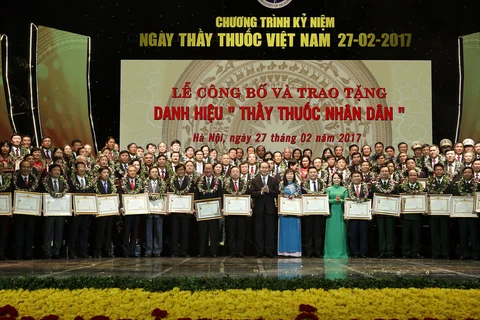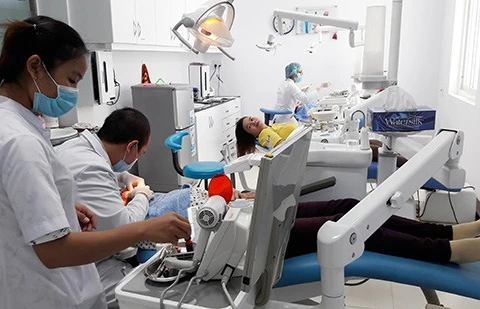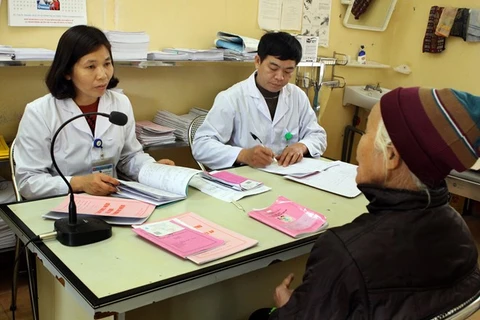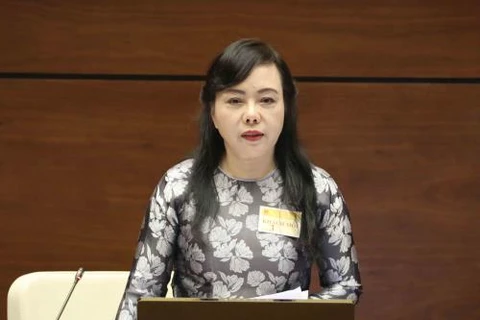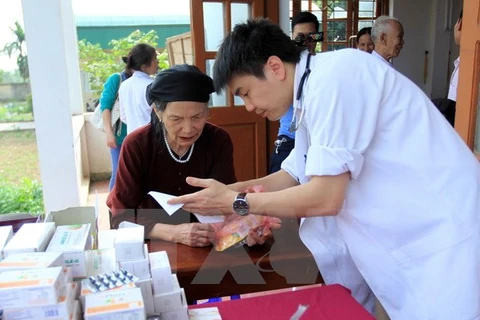 Young doctors give free-of-charge health examination to residents of Sin Ho district in the northern mountainous province of Lai Chau (Photo: VNA)
Young doctors give free-of-charge health examination to residents of Sin Ho district in the northern mountainous province of Lai Chau (Photo: VNA) Hanoi (VNA) - New medical graduates could be required to work for three to five years at healthcare centres in outlying regions to meet a critical lack of doctors and help improve healthcare services there.
Pham Van Tac, Director of the Personnel Department under the Ministry of Health, said the proposed initiative would require graduates to work at district and commune-level healthcare centres, particularly in Vietnam’s 62 most disadvantaged districts.
“In the future, the requirement could be included in a law on social responsibilities and obligations of medical workers,” Tac told the Nhan Dan (People’s) newspaper, adding that this would be a condition for a license to practice medicine.
In 2013, the Health Ministry launched a pilot programme for young doctors to volunteer in disadvantaged areas. Last month, after undergoing specialised training, 78 volunteers from central and provincial hospitals went to work in poor communes and districts of four northern provinces - Lao Cai, Son La, Bac Kan and Dien Bien.
According to the Health Ministry, the public healthcare sector in Vietnam’s 62 poorest districts faces a shortage of about 600 doctors in 15 specialities.
Director of the Cao Bang province Health Department Luc Van Dai, said that the province had 199 commune healthcare centres but only 90 had facilities meeting national standards, 40 needed more doctors and some didn’t even have one doctor. All the district general hospitals in the province lacked doctors.
For example, the Bac Ha district General Hospital in northern Lao Cai province has not received any new doctors in the last ten years, and some good ones have left. Vice director of the hospital Nguyen Nhu Tuan said there was a critical shortage of doctors for important departments like cardiology, and the hospital cannot perform half the treatments required by the health ministry of district hospitals.
A shortage of high-quality medical workers has been blamed for public mistrust in grassroots healthcare, resulting in overcrowding at higher-level hospitals, according to the ministry.
[Young doctors volunteer to work in poor districts]
Health Minister Nguyen Thi Kim Tien said that working at grassroots healthcare centres in disadvantaged areas could offer young doctors practical lessons in various diseases and give them the chance to implement clinical treatments.
“Without strengthening grassroots healthcare, Vietnam’s healthcare sector can’t address major issues like non-communicable diseases, child malnutrition, life span and the height and weight of Vietnamese,” she said.
“If Vietnam can improve primary healthcare by sending high-quality staff to grassroots facilities, they will earn the trust of local people. They will use local healthcare centres instead of flocking to central-level hospitals,” she added.
Vu Thi Ly, a new graduate from Vietnam University of Traditional Medicine, said she agreed with Minister Tien about the advantages of working in primary healthcare centres. “We are aware of the disadvantages, too. For example, poor facilities and infrastructure put higher pressure on medical workers and patients, especially in emergencies,” she said. “Working in remote, disadvantaged areas should be optional instead of compulsory.”
Ly also said that policies for medical workers, particularly payment and allowances, should be improved to attract them to the public healthcare system.
Nguyen Lan Phuong, a new graduate from the Vietnam Military Medical University, told Viet Nam News that medical students have longer training programmes than other students - six years instead of four - and are then required to do an internship of up to 18 months, part of which they have to fund themselves.
“If medical graduates are required to work in remote, disadvantaged areas to earn a licence, this means we have more challenges to overcome. The challenge will surely cost time, money and sweat,” she said.-VNA
VNA
